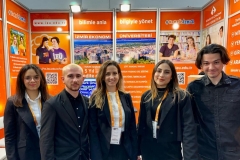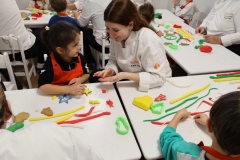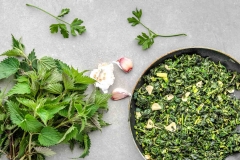
SCHOOL OF APPLIED MANAGEMENT SCIENCES
Gastronomy and Culinary Arts Program
GENS 201 | Course Introduction and Application Information
| Course Name |
Fundemantals of Natural Sciences
|
|
Code
|
Semester
|
Theory
(hour/week) |
Application/Lab
(hour/week) |
Local Credits
|
ECTS
|
|
GENS 201
|
Fall/Spring
|
3
|
0
|
3
|
6
|
| Prerequisites |
None
|
|||||
| Course Language |
English
|
|||||
| Course Type |
Service Course
|
|||||
| Course Level |
First Cycle
|
|||||
| Mode of Delivery | - | |||||
| Teaching Methods and Techniques of the Course | - | |||||
| Course Coordinator | ||||||
| Course Lecturer(s) | ||||||
| Assistant(s) | - | |||||
| Course Objectives | This course aims to teach the students to solve the encountered problems in natural sciences with scientific thinking |
| Learning Outcomes |
The students who succeeded in this course;
|
| Course Description | This course comprises the scientific thinking approach to the encountered problems and the fundamental principles of natural sciences and of life. |
|
|
Core Courses | |
| Major Area Courses | ||
| Supportive Courses | ||
| Media and Management Skills Courses | ||
| Transferable Skill Courses |
WEEKLY SUBJECTS AND RELATED PREPARATION STUDIES
| Week | Subjects | Related Preparation |
| 1 | Introduction to the course | Examination of the posted HIM 103 syllabus Prepare how to introduce yourself (write on a piece of paper for your own) (Name, High School, Hobby, and What you expect from this course in one sentence) |
| 2 | Introduction to Science | Student should read: The Nature of Scientific Thinking (Harvard Graduate School of Education)- the related chapters of the reference material (pages 4-12). https://www.youtube.com/watch?v=E_PKQ_M7AtU&t=41s |
| 3 | Identifying & Describing Problems | Student should read: Miniature Guide to Critical Thinking – Concepts and Tools” (Dr. Richard Paul and Dr. Linda Elder)- the related chapters of the reference material. Student should prepare a short list of daily problems he/she encounters Examination of provided cases and presentations http://www.studygs.net/problem/problemsolvingv1.htm https://www.youtube.com/watch?v=8B271L3NtAw |
| 4 | Scientific Methodology | Student should read “A Miniature Guide to Scientific Thinking” (by Dr. Richard Paul and Dr. Linda Elder) pages 2-14 and Instructors' Notes https://www.youtube.com/watch?v=tUP8rFWzVt4 |
| 5 | Database Searching and Presenting Scientific Information 1. Accessing information and testing its accuracy: Google Scholar -Pubmed 2.How to Prepare an oral presentation? 3.How to prepare a poster presentation? | |
| 6 | Scientific Persona (Student Oral Presentations) | Preparation of presentations on topics previously selected |
| 7 | Introduction to Natural Sciences | Instructors’ Notes http://learn.genetics.utah.edu/content/selection/recipe/ http://learn.genetics.utah.edu/content/selection/misconceptions/ |
| 8 | MIDTERM | Contents of weeks 1-7 |
| 9 | Basic Principles of Earth Sciences | Instructors’ Notes https://www.youtube.com/watch?v=JGXi_9A__Vc |
| 10 | Basic Principles of Life I Cell & Homeostasis | Instructors’ Notes Reading basic concepts from Campbell Biology, 10th Edition (Reece, et al.) https://www.youtube.com/watch?v=URUJD5NEXC8 |
| 11 | Basic Principles of Life II Biomolecules Energy for life Introduction to Metabolism | Insructors’ Notes Basic Medical Biochemistry-A Clinical Approach, 3rd Edition (Liebermann and Marks) (Pages 341-347) |
| 12 | Basic Principles of Life III Basic Structure & Function of Human Body | Instructors’ Notes |
| 13 | Students’ Oral Presentations Evaluation of a Poster presentation Feedback for the whole course | 1) Student should prepare a summary (slide presentation) of the Project Homework with his/her group, according to “oral presentation guidelines”. The slide presentation (max. 2 slides) should include: Topic of Project-Scientific Question-Hypothesis-Aim and Objectives 2) Student should prepare some questions and also some feedback on the whole course (One good point and one bad point) |
| 14 | Students’ Poster presentations (Project on Natural Sciences) | Student should prepare his/her poster according to the poster presentation guidelines and hang them on the Poster Area (Block A first floor) before 10:00 in the morning, 17.05.2017. Students should be presenting their posters between 10:00 and 12:50. A review committee will ask questions and review and evaluate the posters. |
| 15 | FINAL | Weeks 1-15 |
| 16 | Review of the Semester |
| Course Notes/Textbooks |
|
|
| Suggested Readings/Materials |
EVALUATION SYSTEM
| Semester Activities | Number | Weigthing |
| Participation |
1
|
10
|
| Laboratory / Application | ||
| Field Work | ||
| Quizzes / Studio Critiques |
3
|
15
|
| Portfolio | ||
| Homework / Assignments |
1
|
10
|
| Presentation / Jury | ||
| Project | ||
| Seminar / Workshop | ||
| Oral Exams | ||
| Midterm |
1
|
25
|
| Final Exam |
1
|
40
|
| Total |
| Weighting of Semester Activities on the Final Grade |
5
|
60
|
| Weighting of End-of-Semester Activities on the Final Grade |
1
|
40
|
| Total |
ECTS / WORKLOAD TABLE
| Semester Activities | Number | Duration (Hours) | Workload |
|---|---|---|---|
| Theoretical Course Hours (Including exam week: 16 x total hours) |
16
|
3
|
48
|
| Laboratory / Application Hours (Including exam week: '.16.' x total hours) |
16
|
0
|
|
| Study Hours Out of Class |
14
|
3
|
42
|
| Field Work |
0
|
||
| Quizzes / Studio Critiques |
3
|
5
|
15
|
| Portfolio |
0
|
||
| Homework / Assignments |
1
|
30
|
30
|
| Presentation / Jury |
15
|
0
|
|
| Project |
0
|
||
| Seminar / Workshop |
0
|
||
| Oral Exam |
0
|
||
| Midterms |
1
|
10
|
10
|
| Final Exam |
1
|
15
|
15
|
| Total |
160
|
COURSE LEARNING OUTCOMES AND PROGRAM QUALIFICATIONS RELATIONSHIP
|
#
|
Program Competencies/Outcomes |
* Contribution Level
|
||||
|
1
|
2
|
3
|
4
|
5
|
||
| 1 | Successfully applies theoretical and practical knowledge and skills in Gastronomy and Culinary Arts |
|||||
| 2 | Carries best practices in terms of work and food security, safety and hygiene in food production |
|||||
| 3 | Appreciates, evaluates and makes decisions regarding to visual, textual and nutritional data with respect to food production and presentation |
|||||
| 4 | Recognizes and evaluates the impact of gastronomy on culture and society |
|||||
| 5 | Assumes responsibility for solving complex problems that may occur in the field of Gastronomy and Culinary Arts, both individually and as a team member |
|||||
| 6 | Evaluates the knowledge and skills acquired in the field of Gastronomy and Culinary Arts with a critical approach and effectively communicate their ideas and suggestions for solutions in written and oral form. |
|||||
| 7 | Possesses necessary knowledge and skills in relevant fields such as gastronomy, design, law and management and effectively apply them to the practice of Culinary Arts |
|||||
| 8 | Uses the technological tools related to Gastronomy and Culinary Arts effectively |
|||||
| 9 | Updates and improve the knowledge, skills and competencies related to Gastronomy and Culinary Arts with lifelong learning awareness and sustainability with an ethical approach |
|||||
| 10 | Collects data in the areas of Gastronomy and Culinary Arts and communicate with colleagues in a foreign language. (European Language Portfolio Global Scale”, Level B1) |
|||||
| 11 | Speaks a second foreign at a medium level of fluency efficiently |
|||||
| 12 | Relates the knowledge gained through the history of humanity to the field of expertise |
|||||
*1 Lowest, 2 Low, 3 Average, 4 High, 5 Highest
NEWS |ALL NEWS
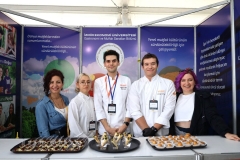
Aegean flavors from the chefs of the future
Izmir University of Economics (IUE) Department of Gastronomy and Culinary Arts left its mark on the 6th Izmir GastroFest, organized this year with
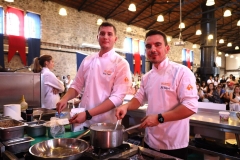
They added flavor to GURMEFEST
GURMEFEST, one of the biggest food, drink and entertainment festivals of Izmir, was ‘flavored’ with the dishes prepared and presented by the
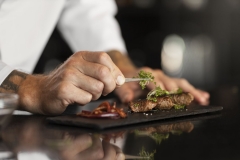
“Izmir and Bodrum will class up”
The MICHELIN Guide, one of the most prestigious restaurant rating systems in the world, has added Izmir and Bodrum to its Turkish
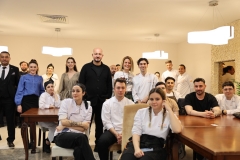
IUE graduates will prepare the flavors unique to Turkish cuisine
Bilsev Group, who is preparing to expand to Dubai this year with its Ferdi Baba, Fabrice Restaurant and Baba Pizza brands, will
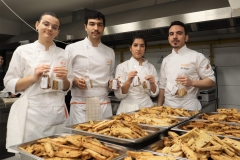
They prepared products that are filling and have a long shelf life
25 students of Department of Gastronomy and Culinary Arts of Izmir University of Economics (IUE) prepared products with a long shelf life,



